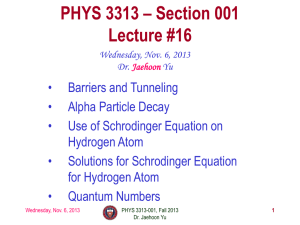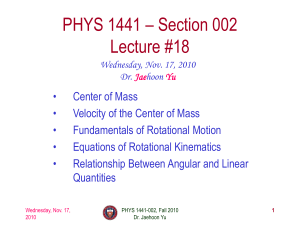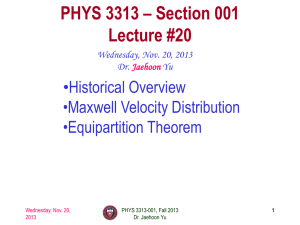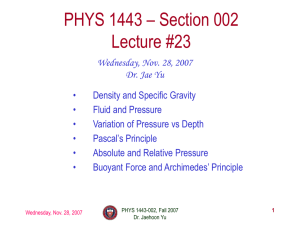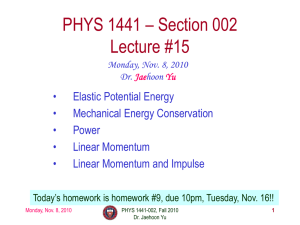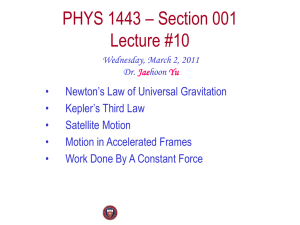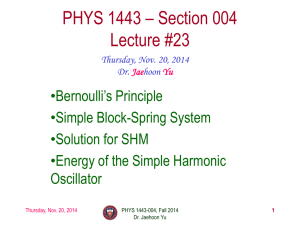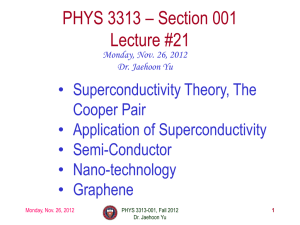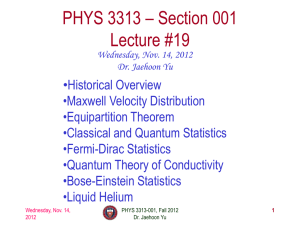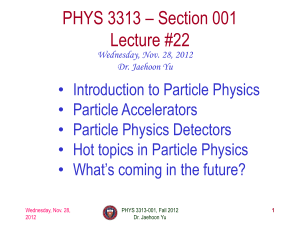Wednesday, November 24, 2010
advertisement
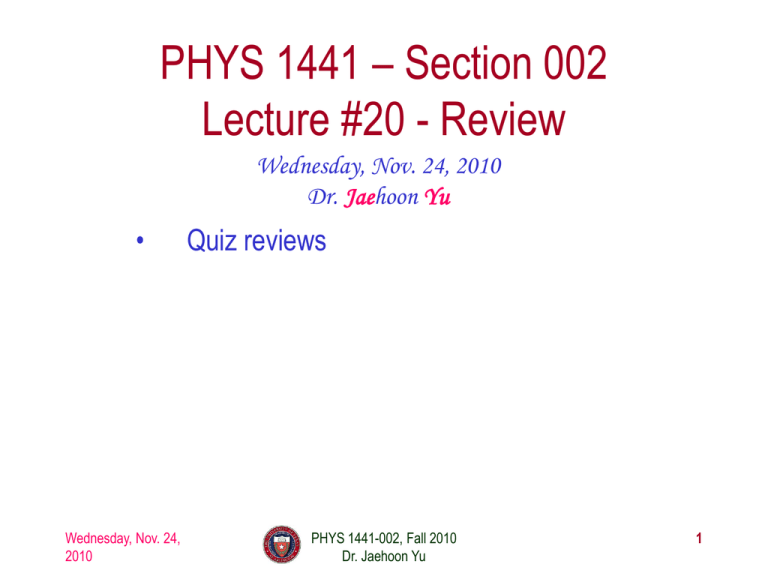
PHYS 1441 – Section 002 Lecture #20 - Review Wednesday, Nov. 24, 2010 Dr. Jaehoon Yu • Wednesday, Nov. 24, 2010 Quiz reviews PHYS 1441-002, Fall 2010 Dr. Jaehoon Yu 1 Quiz4 – #2 A 6.0 kg ball traveling at 13 m/s collides head on with a 3.0 kg ball at rest. Assuming a perfectly inelastic collision, what is the speed of the two-ball system just after the collision? • Must use the Momentum Conservation and the perfectly inelastic collision – In any collisions, momentum is conserved!! m1v1i m2 v2i m1v1 f m2 v2 f m1 m2 v f m1v1i m2 v2i vf m1 m2 v1i 13m s;v2i 0 m s m1 6kg; m2 3kg m1v1i m2 v2i 6 13 vf 8.7 m s m1 m2 63 Wednesday, Nov. 24, 2010 PHYS 1441-002, Fall 2010 Dr. Jaehoon Yu 2 Quiz4 – # [4 – 6] A block of mass 10kg originally at rest slides down a 30 degree frictionless slope of the vertical height 10m. It then travels 3m on a flat floor whose coefficient of kinetic friction with the block is 0.3, presses the spring of constant 2.0N/m located on the frictionless part of the floor and stops. Answer the following questions. 4. What is the block’s speed at the bottom of the incline? • Since this portion of the motion is under the conservative force, the total mechanical energy is conserved. Thus, 1 2 PE KE i PE KE f mgh mv 2 v 2gh 2 9.8 10 14 m s Wednesday, Nov. 24, 2010 PHYS 1441-002, Fall 2010 Dr. Jaehoon Yu 3 Quiz4 – # [4 – 6] A block of mass 10kg originally at rest slides down a 30 degree frictionless slope of the vertical height 10m. It then travels 3m on a flat floor whose coefficient of kinetic friction with the block is 0.3, presses the spring of constant 2.0N/m located on the frictionless part of the floor and stops. Answer the following questions. 5. What is the kinetic energy of the block just before it hits the spring? • Since the block traveled on the portion of the floor friction exists, the work done by the friction must be taken away from its total mechanical energy. Thus, KE f KEi W f mgh W f W f Ff d k mgd 0.310 9.8 3 88.2 J KE f mgh k mgd 980 88.2 891.8 J Wednesday, Nov. 24, 2010 PHYS 1441-002, Fall 2010 Dr. Jaehoon Yu 4 Quiz4 – # [4 – 6] A block of mass 10kg originally at rest slides down a 30 degree frictionless slope of the vertical height 10m. It then travels 3m on a flat floor whose coefficient of kinetic friction with the block is 0.3, presses the spring of constant 2.0N/m located on the frictionless part of the floor and stops. Answer the following questions. 6. What is the distance the spring is pressed from its equilibrium position? • Since now the block travels on the frictionless portion of the floor friction exists, all of the remaining kinetic energy is stored into the spring as the elastic potential energy. Thus 1 2 KE kx 2 x 2KE k 2 891.8 2 29.9m Wednesday, Nov. 24, 2010 PHYS 1441-002, Fall 2010 Dr. Jaehoon Yu 5 A block of mass 5 kg is on a frictionless surface and is attached to a spring with the spring constant 2000 N/m. The spring is compressed 2 cm from its equilibrium position and released from rest. What is speed of the block as it passes through the equilibrium position of the spring? • Must use the Energy Conservation!! Wednesday, Nov. 24, 2010 PHYS 1441-002, Fall 2010 Dr. Jaehoon Yu 6 Quiz4 – #7. A person ascends a flight of stairs in 20 s. The person weighs 500 N and the vertical height of the stairs is 9 m. What is the person's power output? • The total work the person has to input is the same as the potential energy at the top of the stairs. Thus, W mgh 500 9 4500 J t 20s W 4500 P 225 W t 20 Wednesday, Nov. 24, 2010 PHYS 1441-002, Fall 2010 Dr. Jaehoon Yu 7 Quiz3 – #2. Two forces act on a 9.0-kg block resting on a frictionless surface as shown. What is the magnitude 3.7 N of the horizontal acceleration of the block? • 5.9 N 43° Since the force is in two dimension, one needs to work in two dimensions. The force needs to be split into x and y components. Now since the problem is asking only for the horizontal acceleration of the block, one needs to work in x- axis only. Wednesday, Nov. 24, 2010 PHYS 1441-002, Fall 2010 Dr. Jaehoon Yu 8 Quiz 2 – #1. A projectile is launched at an angle of 30o with respect to the horizontal at the speed of 100m/s. What is its speed when it reaches its maximum altitude? • In a projectile motion, the acceleration is only on y direction but no acceleration on x. v0 x v0 cos 100 cos 30o 87 m s v0 y v0 sin 100 sin 30o 50 m s ax 0 m s ;ay 9.8 m s 2 2 at the peak, vy 0while vx v0 x v vx2 vy2 v0 x 87 m s Wednesday, Nov. 24, 2010 PHYS 1441-002, Fall 2010 Dr. Jaehoon Yu 9 Quiz 2 – 4 – 6] A projectile is launched with the speed of 50 m/s at an angle of 45 o with respect to the horizontal axis. The magnitude of the gravitational acceleration is 9.8 . Ignore the air resistance. • In a projectile motion, the acceleration is only on y direction but no acceleration on x. Wednesday, Nov. 24, 2010 PHYS 1441-002, Fall 2010 Dr. Jaehoon Yu 10

